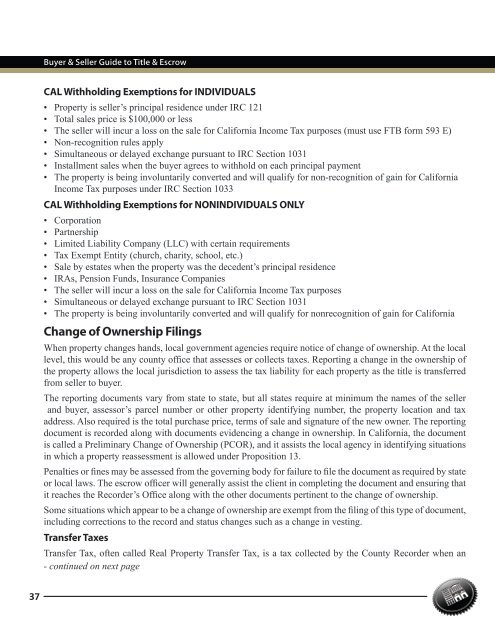Buyer & Seller Guide - Fidelity National Title
Buyer & Seller Guide - Fidelity National Title
Buyer & Seller Guide - Fidelity National Title
Create successful ePaper yourself
Turn your PDF publications into a flip-book with our unique Google optimized e-Paper software.
37<br />
<strong>Buyer</strong> & <strong>Seller</strong> <strong>Guide</strong> to <strong>Title</strong> & Escrow<br />
CAL Withholding Exemptions for INDIVIDUALS<br />
• Property is seller’s principal residence under IRC 121<br />
• Total sales price is $100,000 or less<br />
• The seller will incur a loss on the sale for California Income Tax purposes (must use FTB form 593 E)<br />
• Non-recognition rules apply<br />
• Simultaneous or delayed exchange pursuant to IRC Section 1031<br />
• Installment sales when the buyer agrees to withhold on each principal payment<br />
• The property is being involuntarily converted and will qualify for non-recognition of gain for California<br />
Income Tax purposes under IRC Section 1033<br />
CAL Withholding Exemptions for NONINDIVIDUALS ONLY<br />
• Corporation<br />
• Partnership<br />
• Limited Liability Company (LLC) with certain requirements<br />
• Tax Exempt Entity (church, charity, school, etc.)<br />
• Sale by estates when the property was the decedent’s principal residence<br />
• IRAs, Pension Funds, Insurance Companies<br />
• The seller will incur a loss on the sale for California Income Tax purposes<br />
• Simultaneous or delayed exchange pursuant to IRC Section 1031<br />
• The property is being involuntarily converted and will qualify for nonrecognition of gain for California<br />
Change of Ownership Filings<br />
When property changes hands, local government agencies require notice of change of ownership. At the local<br />
level, this would be any county office that assesses or collects taxes. Reporting a change in the ownership of<br />
the property allows the local jurisdiction to assess the tax liability for each property as the title is transferred<br />
from seller to buyer.<br />
The reporting documents vary from state to state, but all states require at minimum the names of the seller<br />
and buyer, assessor’s parcel number or other property identifying number, the property location and tax<br />
address. Also required is the total purchase price, terms of sale and signature of the new owner. The reporting<br />
document is recorded along with documents evidencing a change in ownership. In California, the document<br />
is called a Preliminary Change of Ownership (PCOR), and it assists the local agency in identifying situations<br />
in which a property reassessment is allowed under Proposition 13.<br />
Penalties or fines may be assessed from the governing body for failure to file the document as required by state<br />
or local laws. The escrow officer will generally assist the client in completing the document and ensuring that<br />
it reaches the Recorder’s Office along with the other documents pertinent to the change of ownership.<br />
Some situations which appear to be a change of ownership are exempt from the filing of this type of document,<br />
including corrections to the record and status changes such as a change in vesting.<br />
Transfer Taxes<br />
Transfer Tax, often called Real Property Transfer Tax, is a tax collected by the County Recorder when an<br />
- continued on next page


